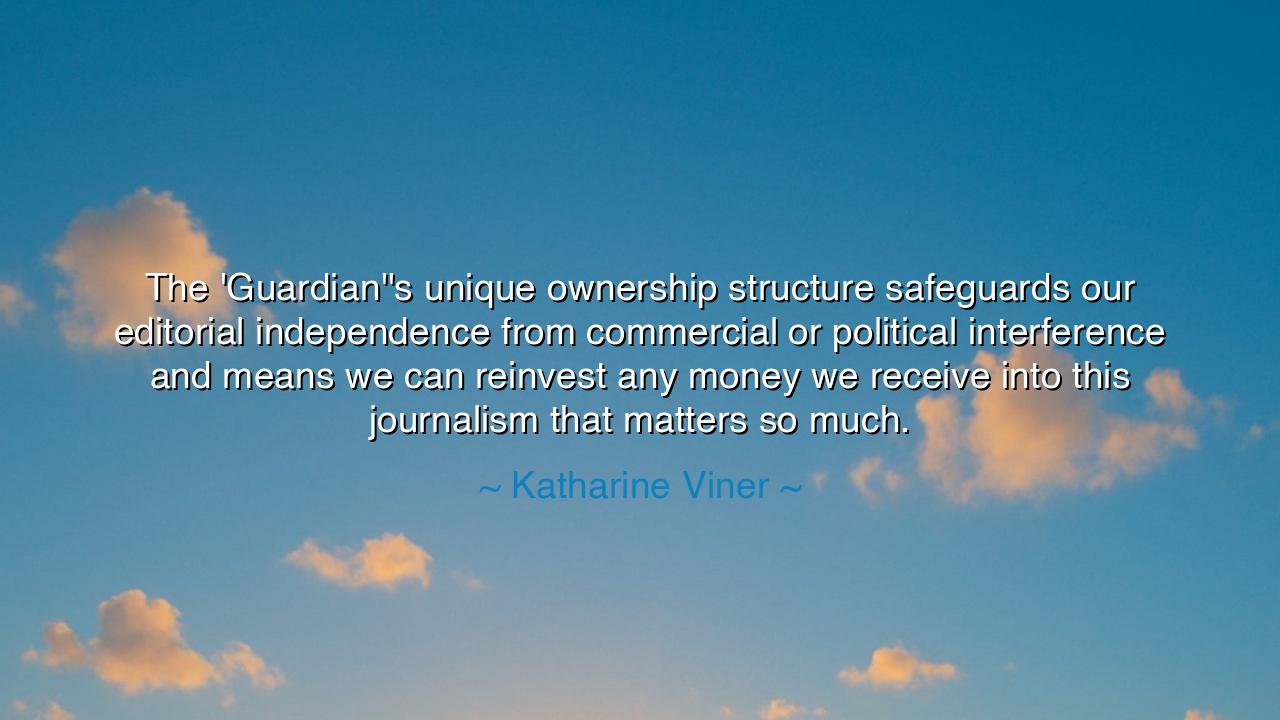
The 'Guardian''s unique ownership structure safeguards our
The 'Guardian''s unique ownership structure safeguards our editorial independence from commercial or political interference and means we can reinvest any money we receive into this journalism that matters so much.






The editor and guardian of truth, Katharine Viner, once declared: “The Guardian’s unique ownership structure safeguards our editorial independence from commercial or political interference and means we can reinvest any money we receive into this journalism that matters so much.” In these words, she speaks not only of a newspaper, but of an ancient principle — the sacred duty of truth to stand unbent before power. Her statement is both practical and prophetic: it reminds us that independence — whether of a journalist, a citizen, or a nation — is not sustained by wealth or status, but by integrity and purpose. To be free from manipulation, one must not serve two masters: neither gold nor authority, but only the truth itself.
At its heart, Viner’s reflection speaks to the eternal struggle between truth and influence. In every age, those who seek to tell the truth have faced the shadow of control — the pressure of kings, of merchants, of rulers who would bend the narrative to their own gain. By protecting its structure from both commercial greed and political dominance, The Guardian does not simply preserve its freedom — it preserves the very essence of journalism as a public trust. For when truth is sold, it ceases to enlighten; it becomes a tool of deception. But when truth is protected, it becomes a light for all who seek to see clearly in the fog of manipulation and misinformation.
The origin of this principle reaches deep into the moral foundations of civilization. Long before the age of printing presses or digital screens, the philosophers of ancient Greece — men like Socrates and Plato — spoke of the duty of the mind to remain uncorrupted by wealth and power. Socrates himself, when offered the chance to escape execution by betraying his ideals, chose death instead. His life was the ultimate act of intellectual independence, an unyielding stand against the tyranny of conformity. So too, in the modern age, does Viner echo this same creed: that to safeguard truth, one must first build a fortress of principle around it.
History offers countless warnings of what happens when this independence is lost. In the early twentieth century, the great newspapers of Europe and America were often bound by their financiers — the powerful magnates whose wealth dictated what could be printed and what must be silenced. Propaganda replaced journalism, and truth became a servant of the state. Yet, there have also been moments of heroism. During the Watergate scandal, journalists at The Washington Post defied political pressure and risked their careers to expose corruption at the highest level of government. Their courage — like the structure Viner describes — was founded upon one conviction: that truth, when freed from control, has the power to hold the mighty to account.
The Guardian’s model, in which ownership is placed in the hands of a trust rather than investors or politicians, stands as a testament to this ideal. It is not merely a structure of business — it is a moral architecture. It allows the paper to pursue stories that may anger the powerful, to uncover injustices that others might fear to touch, and to give voice to those whom history would otherwise silence. In Viner’s words, the purpose of this structure is not profit, but reinvestment — a continual renewal of the mission to inform, enlighten, and protect democracy through fearless journalism.
And what is democracy, if not the freedom of people to know and to think for themselves? Without independent truth, democracy becomes a theater of illusion. The ancients understood this as well: when the philosopher Aristotle wrote that “the least deviation from truth will be multiplied later a thousandfold,” he foresaw the decay that follows when falsehood becomes habitual. The independent voice — whether it speaks from a newspaper, a classroom, or a solitary conscience — is the only bulwark against that decay.
From Viner’s words we may draw a lesson that transcends journalism: that integrity is the foundation of all true independence. In our own lives, we too face the choice between convenience and conviction, between pleasing others and remaining faithful to what we know is right. Whether in business, art, or daily speech, the same law applies: do not let your truth be bought. Build your life upon principles that cannot be bribed, and you will stand as free as the paper she defends.
Thus, let us remember her wisdom as both an example and a challenge. Freedom of thought and freedom of truth are not accidents — they are maintained by vigilance, sacrifice, and courage. Just as The Guardian’s structure safeguards its voice, so must we each build the architecture of our own integrity, so that no force — not money, not approval, not fear — can silence the truth within us. For in the end, it is not wealth or power that sustains a people, but their willingness to protect and honor the light of truth — that sacred flame which, once extinguished, leaves the world in darkness.






AAdministratorAdministrator
Welcome, honored guests. Please leave a comment, we will respond soon